Home / Albums / Tag Century:19th 870

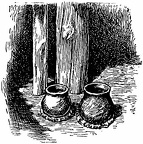 An earthen pot full of water stood by one of the posts near the fire
An earthen pot full of water stood by one of the posts near the fire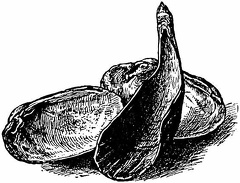 My mothers dipped each a big horn spoon full of water
My mothers dipped each a big horn spoon full of water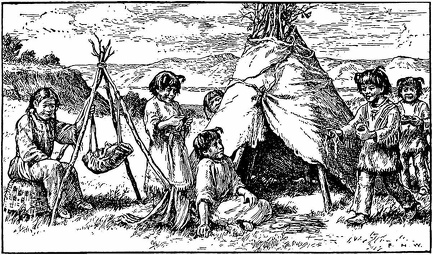 Childhood games
Childhood games They looked very terrible, all painted with the lower half of the face black
They looked very terrible, all painted with the lower half of the face black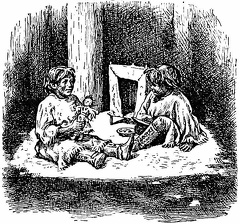 My little half sister was my usual playmate. She was two years younger than I, and I loved her dearly
My little half sister was my usual playmate. She was two years younger than I, and I loved her dearly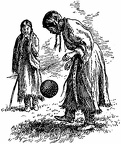 We also had a big, soft ball, stuffed with antelope hair, which we would bounce in the air with the foot
We also had a big, soft ball, stuffed with antelope hair, which we would bounce in the air with the foot The game was to see how many times she could be tossed without falling
The game was to see how many times she could be tossed without falling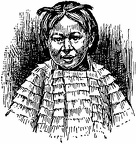 Until I was about nine years old, my hair was cut short
Until I was about nine years old, my hair was cut short Offering food before the shrine of the Big Birds’ ceremony
Offering food before the shrine of the Big Birds’ ceremony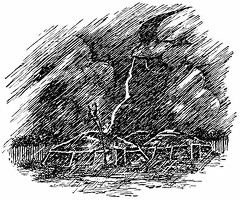 As the man sat in his lodge, there came a clap of thunder and lightning struck his roof, tearing a great hole
As the man sat in his lodge, there came a clap of thunder and lightning struck his roof, tearing a great hole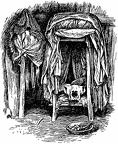 Big Birds’ ceremony
Big Birds’ ceremony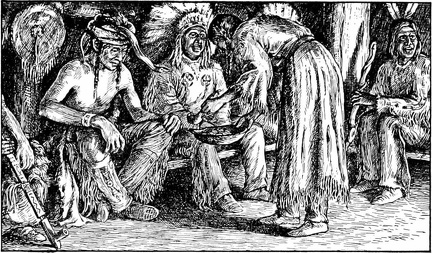 Kinship
Kinship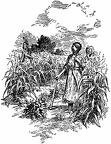 Sing louder cousin, sing louder, that I may hear you
Sing louder cousin, sing louder, that I may hear you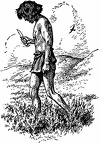 When a man mourned he cut off his hair, painted his body with white clay
When a man mourned he cut off his hair, painted his body with white clay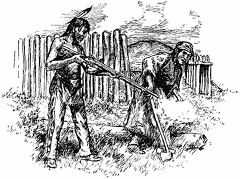 Snake Head-Ornament came close to her and fired off his gun
Snake Head-Ornament came close to her and fired off his gun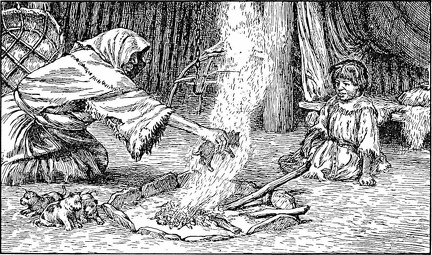 Indian Dogs
Indian Dogs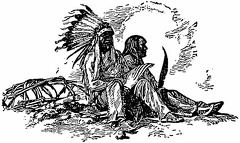 In daytime lookouts were always on the roofs of some of the lodges
In daytime lookouts were always on the roofs of some of the lodges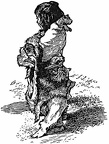 I would lay the puppy between my shoulders and draw my tiny robe up over his back
I would lay the puppy between my shoulders and draw my tiny robe up over his back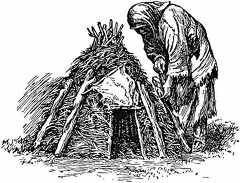 She laid the grass thickly over the sides of the little tepee
She laid the grass thickly over the sides of the little tepee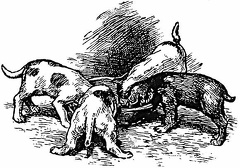 They ate it greedily. It did not seem to harm them
They ate it greedily. It did not seem to harm them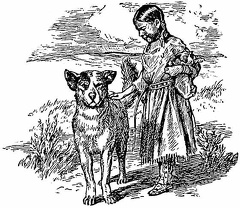 We Hidatsas loved our good dogs, and were kind to them
We Hidatsas loved our good dogs, and were kind to them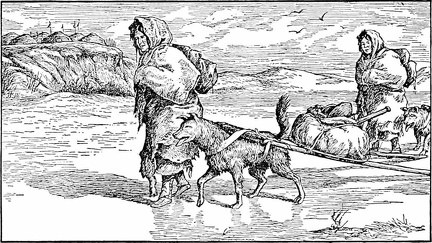 Our dogs dragged well-laden travois
Our dogs dragged well-laden travois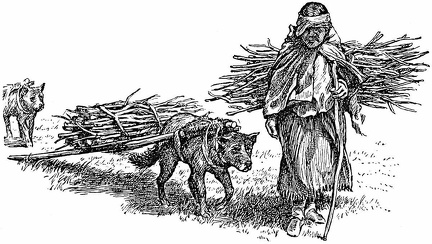 Each dog dragged a travois loaded with wood
Each dog dragged a travois loaded with wood The harness was of two pieces - a collar, to go around the dog’s neck
The harness was of two pieces - a collar, to go around the dog’s neck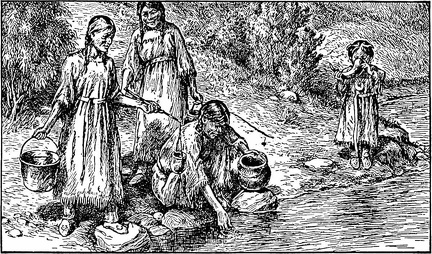 Learning to work
Learning to work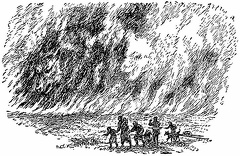 They saw two great fires sweeping toward them over the prairie
They saw two great fires sweeping toward them over the prairie Buffalo heart skin bucket
Buffalo heart skin bucket My grandmother Turtle made scarecrows to frighten away the birds
My grandmother Turtle made scarecrows to frighten away the birds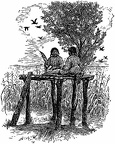 A watchers’ stage
A watchers’ stage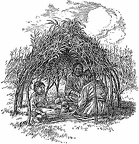 At one side of our field Turtle had made a booth
At one side of our field Turtle had made a booth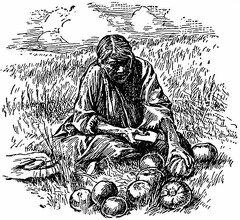 We were fond of squashes and ate many of them
We were fond of squashes and ate many of them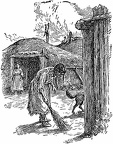 I was too well-bred to look up at him, but I did not always hurry to finish my sweeping
I was too well-bred to look up at him, but I did not always hurry to finish my sweeping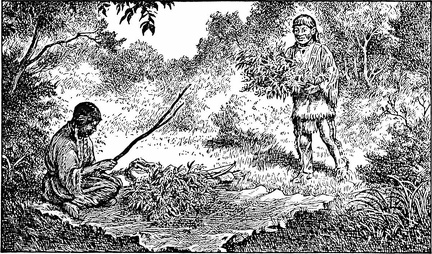 Picking June berries
Picking June berries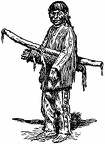 On his back I saw a handsome otter-skin quiver, full of arrows
On his back I saw a handsome otter-skin quiver, full of arrows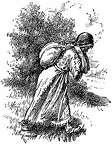 When my sack was filled, I tied it shut and slung it on my back by my packing strap
When my sack was filled, I tied it shut and slung it on my back by my packing strap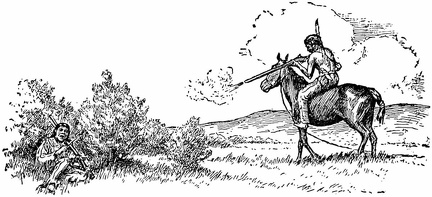 The Sioux fired
The Sioux fired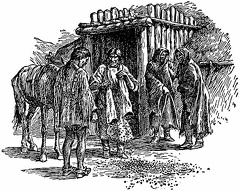 And she turned the leggings up and poured the rose berries out on the ground
And she turned the leggings up and poured the rose berries out on the ground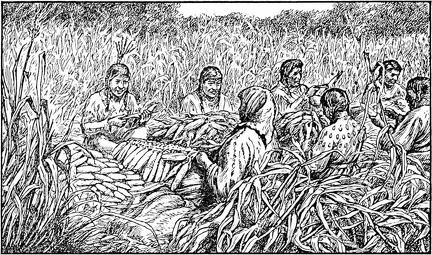 Corn Husking
Corn Husking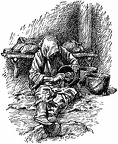 My two mothers, I knew, were planning a big feast
My two mothers, I knew, were planning a big feast The smaller ears we bore to the village in our baskets
The smaller ears we bore to the village in our baskets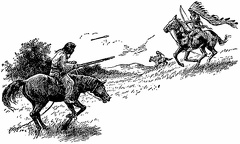 Suddenly a Sioux warrior
Suddenly a Sioux warrior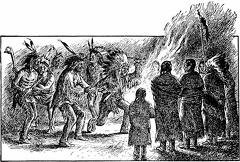 A big fire was built
A big fire was built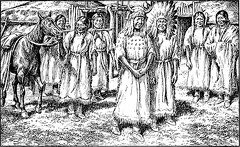 Marriage
Marriage The first he put on my head; the second he handed to my sister, Cold Medicine
The first he put on my head; the second he handed to my sister, Cold Medicine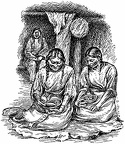 As we two girls sat on the floor, with ankles to the right, as Indian women always sit
As we two girls sat on the floor, with ankles to the right, as Indian women always sit I put the weasel-skin cap on his head
I put the weasel-skin cap on his head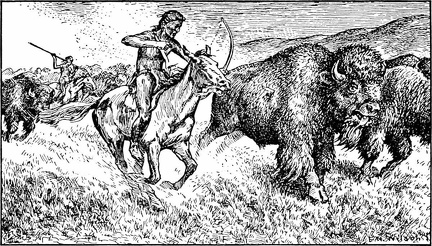 A Buffalo Hunt
A Buffalo Hunt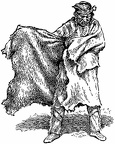 We were clad warmly, for the weather was chill. All had robes
We were clad warmly, for the weather was chill. All had robes The hunters came in
The hunters came in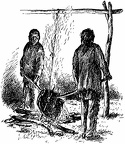 I put on my copper kettle and made blood pudding
I put on my copper kettle and made blood pudding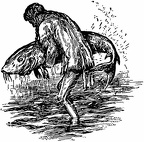 It was a great fish, a sturgeon
It was a great fish, a sturgeon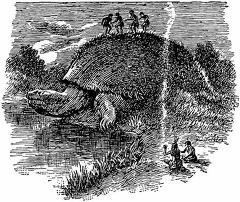 Suddenly the knoll began to shake
Suddenly the knoll began to shake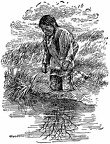 In his shadow he saw what he had been. It was a thorn bush
In his shadow he saw what he had been. It was a thorn bush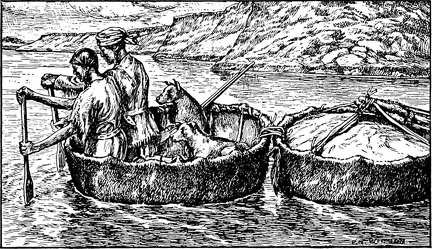 The Hunting Camp
The Hunting Camp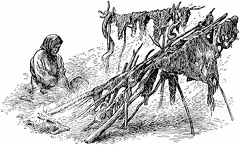 Our stages were now hung with slices of drying meat
Our stages were now hung with slices of drying meat She dropped her pack and came running back, her hands at each side of her head with two fingers crooked, like horns, the sign for buffaloes
She dropped her pack and came running back, her hands at each side of her head with two fingers crooked, like horns, the sign for buffaloes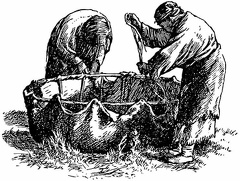 we women busied ourselves making bull boats
we women busied ourselves making bull boats I had hewn this paddle from a cottonwood log, only the day before. My own, lighter and better made
I had hewn this paddle from a cottonwood log, only the day before. My own, lighter and better made Each paddle had a large hole cut in the center of the blade. Without this hole, a paddle wobbled in the current
Each paddle had a large hole cut in the center of the blade. Without this hole, a paddle wobbled in the current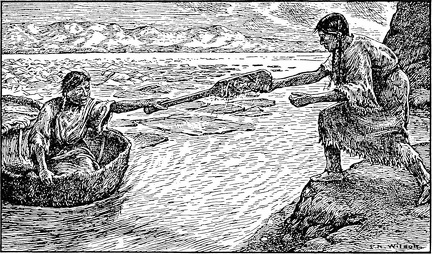 Daughter, save me!
Daughter, save me!



